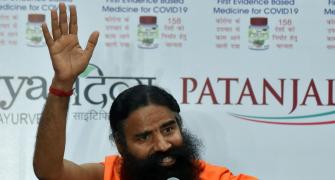Author Ashwin Sanghi says it is possible to 'attract' good luck! Here's how!

Ashwin Sanghi is the author of four bestselling books -- The Rozabal Line, Chanakya's Chant, The Krishna Key and Private India, the last of which he co-authored with the American bestselling writer James Patterson.
Sanghi's next book, 13 Steps to Bloody Good Luck, is also his first work of non-fiction.
In it, he suggests that while some people are 'luckier' than others, it is quite possible to 'attract' good luck.
We can 'train' ourselves to be lucky, he says.
How?
Read this excerpt from 13 Steps to Bloody Good Luck and find out!
Jean Cocteau, the French writer, artist and film director was once asked if he believed in luck. 'Of course,' he replied. 'How else do you explain the success of those you don't like?'
It's true, isn't it? When I am successful, it's because I worked for it, but when someone else is, he probably got lucky!
Common sense tells us that luck can't be controlled. It's related to chance and probability.
According to Anthony Tjan, co-author of the New York Times bestseller Heart, Smarts, Guts, and Luck, there are three types of luck:
Circumstantial Luck: I tag along with a friend to someone else's dinner party and get introduced to someone.
We like each other, get romantically involved and eventually get married.
Being at the right place at the right time made it possible.
The circumstances made it happen.
Constitutional Luck: Age, race, heritage, culture, or upbringing can predispose you to a certain outcome.
For example, being promoted within a company because you are from the boss's hometown is constitutional luck.
Dumb Luck: The sort of luck where one cannot analyse the cause and effect.
Winning the lottery or finding a thousand rupee note on the pavement is simply dumb luck.
While constitutional luck and dumb luck are difficult to control, one can substantially improve the circumstantial luck in one's life.
How? Simply by raising the number of opportunities, recognizing the valuable ones and responding to the best ones.
But how exactly does one raise, recognize and respond?
Let's examine a true-life story to understand the how:
Barnett Helzberg Jr., a successful businessman, had created a chain of extremely profitable jewellery stores with annual revenues above $300 million.
One fine day, while walking in front of the Plaza Hotel in New York, he heard a stranger addressed as 'Mr Buffet'.
Helzberg had heard of the legendary investor Warren Buffet, but had never seen him before.
(In those times, Warren Buffet's face was not universally recognized.)
Helzberg wondered whether the man stepping out of the hotel could be the same financial genius that Helzberg had read about.
Helzberg wanted to exit his business owing to his advancing age.
Based upon some reports he had read, he knew the qualities that Buffet sought in an acquisition.
Helzberg believed that his chain of jewellery stores could meet Buffet's criteria.
Deciding to take the bull by the horns, Helzberg walked up to the stranger and introduced himself.
This turned out to be a great decision. The man was indeed Warren Buffet.
A year later, he acquired Helzberg's business at an excellent valuation.
Lucky break for Helzberg? Sure. But the story illustrates many key attitudes and approaches needed to make that lucky break happen:
Had Helzberg not been alert, he would have missed someone addressing a stranger as 'Mr Buffet'.
Had Helzberg not read up about Buffet and his methods, he would have been unaware of the criteria by which Buffet evaluated acquisition opportunities.
Had Helzberg not been intuitive, he would have ignored Buffet's name being called out.
He would have walked on, rationalizing that the odds of the person being Warren Buffet were simply too low.
Had Helzberg been shy or fearful, he would have avoided going up to Buffet and introducing himself, and the opportunity would have been lost.
Thus, all the significant tools we need (to raise the number of opportunities that come our way, recognize the valuable ones among them and respond effectively to them) fall into two basic categories:
Attitude: This refers to our way of thinking or feeling about someone or something.
Our past successes, failures, interactions and experiences influence our attitudes, thus resulting in a tendency to instinctively favour or disfavour (sometimes erroneously).
Approach: This refers to one's particular way of dealing with a situation or handling a challenge or task.
Approach tends to be influenced by our education, work experience, training and skills.
Pretty much everything we do to make ourselves lucky or unlucky can be traced back to attitude and approach.
Let me illustrate: Richard Wiseman, a psychologist at the University of Hertfordshire, conducted a very interesting experiment to demonstrate that 'lucky' people are lucky because of their approach and attitude rather than chance.
Wiseman advertised in several newspapers and magazines requesting people who viewed themselves as exceptionally lucky or exceptionally unlucky to contact him for a research study.
Around four hundred people, aged between eighteen and eighty-four, volunteered.
These men and women were drawn from all social and economic groups across varied career backgrounds: businessmen, teachers, factory workers, salesmen, secretaries, doctors, etc.
Wiseman asked each volunteer to count the number of photographs in identical newspapers they were given.
Members of the 'unlucky' group took around two minutes each to count the photographs, while members of the 'lucky' group took mere seconds.
What could possibly explain the difference? Wiseman had, rather sneakily, included a message on the newspaper's second page as a half-page ad in large and bold font.
It said, 'Stop counting. There are 43 photographs in this newspaper.'
The message was right there for all to see, but the group that viewed themselves as unlucky were so anxious to get their counting done that they failed to spot the opportunity. They approached the task like a term paper, racing against the clock to get the paper finished.
This prevented them from spotting the opportunity to stop counting!
On the other hand, the lucky group approached the task with less anxiety, greater optimism and in a far more relaxed frame of mind.
They did not see the need to compete, and this relaxed attitude allowed them to observe beyond the immediate task at hand.
This enabled them to spot the ad.
Jonathan Fields, author of Uncertainty: Turning Fear and Doubt into Fuel for Brilliance, says, 'Those who are doggedly attached to the idea they began with may well execute on that idea.
'And do it well and fast. But along the way, they often miss so many unanticipated possibilities, options, alternatives, and paths that would've taken them away from that linear focus on executing on the vision, and sent them back into a place of creative dissidence and uncertainty, but also very likely yielded something orders of magnitude better.'
What does this experiment reveal? Simply that luck is not entirely about chance; it's about the human ability to spot opportunities and make the most out of them. The tools that help us convert opportunities into luck relate to either attitude or approach.
Excerpted from 13 Steps to Bloody Good Luck with kind permission from Westland.









